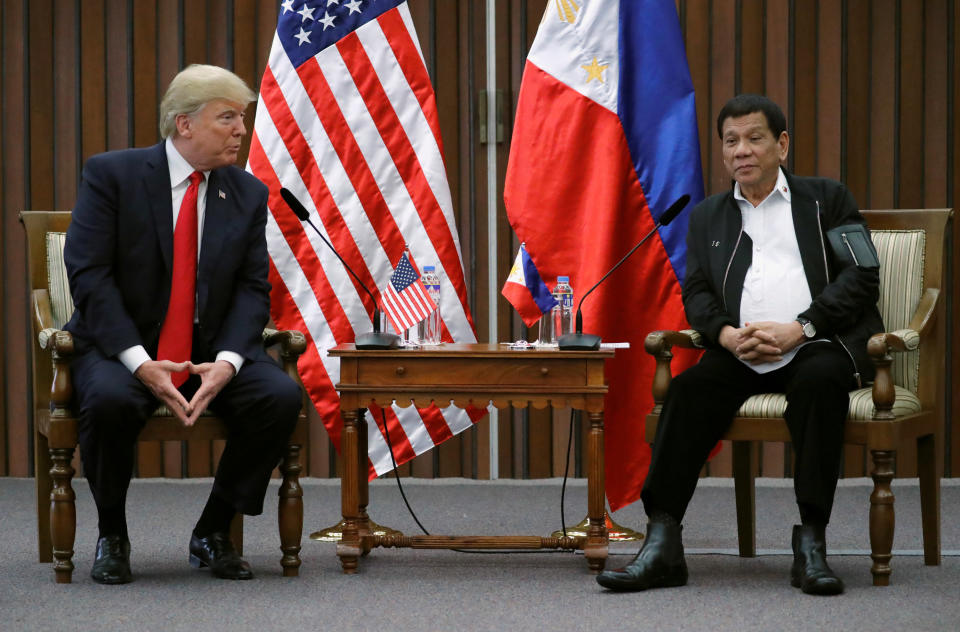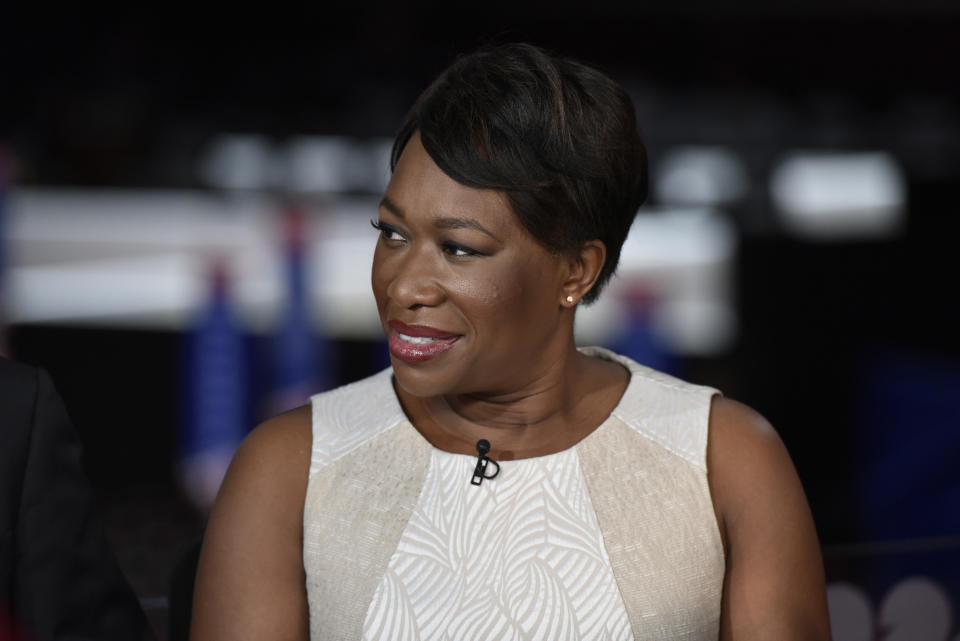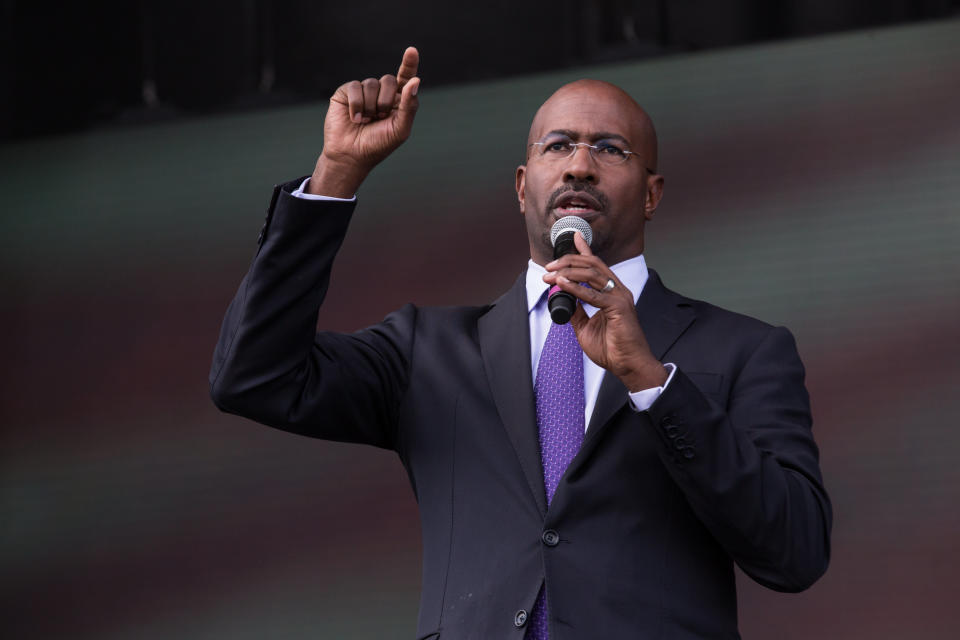Trump Laughs As Philippine Leader Duterte Calls Journalists 'Spies'
President Donald Trump laughed on Monday as his counterpart in the Philippines, Rodrigo Duterte, shut down reporters’ questions on human rights and referred to journalists as “spies.”
Dozens of journalists in the Philippines have been killed with impunity in the last decade, and Duterte’s drug war has led to at least 7,000 extrajudicial killings.
Even Duterte himself has been accused of ordering a journalist to be killed. Two former policemen alleged earlier this year that Duterte, while mayor of Davao City in 2003, paid tens of thousands of dollars to have radio broadcaster Juan Pala murdered. Duterte denied the accusations.
Trump and Duterte met Monday on the sidelines of the Association of Southeast Asian Nations summit, which is being held in the Philippine capital of Manila. It was the first in-person meeting between the two leaders.
“We will be discussing matters that are of interest to both the Philippines and [the U.S.] ... with you around, guys, you are the spies,” Duterte said to reporters on Monday, according to the White House pool report.
Trump laughed in response.

Although Duterte referred to Trump as a “bigot” last year and holds a longstanding personal grudge against the United States, the two leaders have had a fairly warm relationship since Trump took office. Trump told Duterte during a phone call in April that he had heard the leader was doing “an unbelievable job on the drug problem.”
Journalists in the Philippines, on the other hand, have been critical of the abuses in Duterte’s drug war and have been key in exposing the reality of its rampant extrajudicial killings. Philippine media outlets helped bring international attention to the drug war by publishing photos of bodies laying in the streets of Manila, their heads wrapped in packing tape, and of mourners gripping their dead loved ones.
Philippine media also plays a crucial role in holding Duterte’s administration responsible as the president targets opposition figures and guts funding for organizations that provide checks on his actions. Earlier this year, the government reduced funding for the country’s Commission on Human Rights from about $15 million to just $20. After a public outcry, lawmakers decided to set the commission’s funding at $12.2 million.
Duterte did order a new task force in October 2016 to prevent killings targeting the media, but human rights groups say that it has taken little action. Four journalists have been killed in the Philippines since Duterte took office, and the country ranks fifth on the Committee to Protect Journalists’ list of nations where journalists are killed with impunity.
“Just because you are a journalist, you are not exempted from assassination if you’re a son of a bitch,” Duterte said in June 2016.
Duterte using the word “spies” to describe journalists is also notable, as repressive governments often accuse reporters of espionage as an excuse to crack down on press freedom.
After Trump laughed at Duterte’s remark, journalist Sulome Anderson tweeted about how Hezbollah kidnappers tortured her father, Terry Anderson, and accused him of being a spy while he worked for the Associated Press.
My dad was a journalist, not a spy, but after he was kidnapped, he was repeatedly tortured while his captors tried to get him to admit he was. Hilarious. https://t.co/CJ2H7qTC7j
— Sulome Anderson (@SulomeAnderson) November 13, 2017
The White House said Trump brought up human rights issues related to the Philippine drug war during his meeting with Duterte, but the Philippine president’s spokesperson said no such interaction took place.
Former President Barack Obama had a much more strained relationship with the Philippines’ leader. Duterte railed against Obama’s criticism of the drug war, calling him a “son of a whore” and telling him to “go to hell.” The incident prompted Obama to cancel a meeting with Duterte.
Also on HuffPost
Love HuffPost? Become a founding member of HuffPost Plus today.
Joy-Ann Reid | MSNBC Correspondent

Reid, formerly an editor at The Grio, is perhaps best known as a national correspondent for MSNBC and host of the news talkshow "AM Joy." Throughout her career, Reid has consistently matched solid journalism with a fiery passion for truth and justice.
Van Jones | CNN Commentator

A former Obama aide forced to resign amidst controversy in 2009, Jones has since then rebuilt his reputation through his work as a speaker, activist, commentator and host of "The Messy Truth" on CNN. In addition to serving on several activist charity boards, he's currently the president of The Dream Corps, an organization "designed to uplift and empower the most vulnerable in our society" through advocacy projects such as #YesWeCode and Green For All.
Tamika Mallory | Civil Rights Activist and Organizer

Dante Barry | Executive Director of 'Million Hoodies'

Elaine Welteroth | Editor of Teen Vogue

Under the 29-year-old's leadership, "Teen Vogue" has shifted focus to social justice issues, emphasizing in-depth, rigorously reported features and proving that young women have a wider array of interests and passions than we give them credit for.
Yaa Gyasi | Novelist

Damon Young | Editor of Very Smart Brothas

This article originally appeared on HuffPost.

